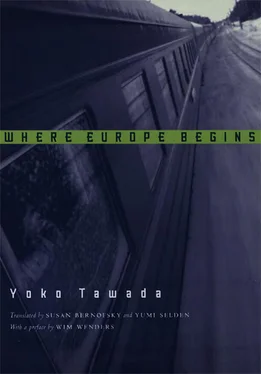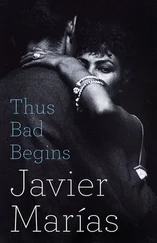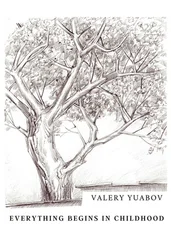When Kinoko-san laughs, I think of the word aristocrat . Willowy, pliant, the nape of her neck exposed, her cheeks soft. Aristocrats are crats who have been “arist.” The moment this thought appeared, I realized I didn’t know how to write it out. There are many ways to write a wrist.
I don’t even know how to write “Kinoko”, for that matter. Perhaps Kinoko-san herself doesn’t know, or she has forgotten or wants to keep it hidden — in any case, she won’t tell me. She did, though, tell me this much, that at first she didn’t even realize the name Kinoko sounded just like the Japanese word for mushroom. Furthermore, it was originally her family name, and the “—ko” was simply part of it, but when written phonetically, the “—ko” looks like the kind of ending which used to be tacked on to the end of girls’ names. So people are always assuming Kinoko is her given name and calling her “Kinoko-san” with an air of particular intimacy. Kinoko-san herself doesn’t like to be constantly clearing up misconceptions, so she lets it go. I wish I had a kanji dictionary. Even if I could never leave the house again, even if I could never again have anything to call my own, if only I could just once consult a kanji dictionary! No doubt because of all this brooding, I had a strange dream. I was sitting alone in a big zasbiki room with mats on the floor when a roof beam above me suddenly burst into flames. In a panic I opened the sliding paper doors and rushed into the hall, but then on the hall floor I found a kanji dictionary bound in leather. I tried to escape with it, but the cover was stuck to the floor and I couldn’t pull it loose. The book was going to burn up along with the rest of the house so I tried to look up the most important characters, but when I started to count the number of strokes, smoke came pouring in from one of the rooms and I couldn’t see. I tried to wave away the smoke with my hand, but then I started coughing, my hands were shaking, and I kept losing count. The fire seemed to be getting closer, my skin was hot, and the ends of my hair began to sizzle. Why was the dictionary stuck to the floor? I didn’t need the cover — all I had to do was tear out the pages and take them with me. So I tried to pull out all the pages at once, and heard a shriek. Impossible, I thought, looking around. There was no one there. Perhaps certain books do scream when they’re torn apart. My field of vision was washed in red from the flames. Crying, I woke up.
The Japanese word for “misheard” sounds like a frog croaking. If there is a frog that croaks “misheard,” there must be others that croak “mistook,” “misread,” and so on. You could line them all up in a row.
When Kinoko-san addresses someone, for some reason she always starts by saying, “Lend me your ear.” She says it so deliberately and with such earnestness one really feels one ought to cut off one’s ear with a fruit knife and lend it to her. A chilling thought. If only she would say the words a bit more lightly, it wouldn’t be necessary to take them so literally. She also likes to say, “I’ll just borrow your ear now, if I may.” Sometimes I want to tell her, “An ear isn’t the sort of thing you just borrow from other people whenever you feel like it,” but then I swallow hard and hold my peace. I bite my nails and tell myself, “All right, then. If she wants an ear, I’ll give her an ear. An ear isn’t something you have less of just because you lend it out. Let’s say you slice it off with one slash of a razor — fine! Then just wind a bandage around what’s left” My speech, unlike Kinoko-san’s, is becoming less elegant by the day.
When approaching another person, it’s immature to begin by saying, “Um…” or “Uh…” On the other hand, “You know” is a bit too self-important, “Excuse me” is too formal, “By the way” too inefficient, and “Now then” too brisk. When you consider the options, Kinoko-san’s ear-borrowing isn’t so bad after all. Having heard it so often, I’m getting used to the phrase. You can get used to almost any phrase if you hear it every day.
But now Kinoko-san has come up with more and more radical variants. First she changed the phrase to “Rend me your ear,” then to “render” and even “surrender.” Since she’s been growing more elegant daily, it isn’t surprising to hear her append an extra syllable, or shift the consonants in one direction or another. Still, it makes my chest clench up to think of rendering my ears.
This reminds me of a painting, an old oil painting about the size of a window. An angel is blowing into a horn, and from the other end of the horn a spurt of liquid flies across the sky right into the Virgin Mary’s ear. Just such a portrayal of the Annunciation is hanging in the abbot’s room. It’s certainly a bit risqué.
“Isn’t this picture a bit risqué?” I ask warily, but the abbot only says, “Not at all, not at all.”
Angels are urban creatures, and thus not necessarily dangerous, though apparently you’re running quite a risk when you see a blue butterfly. The day I first heard this, I was out in the yard alone in the evening and saw a butterfly. Was it blue? I couldn’t be sure it wasn’t. Looking at it more carefully, I noticed that the butterfly had a tiny human face. It fluttered around my head until I couldn’t tell where was earth and where was heaven. And then it happened. Before I knew what had hit me, there was a moist afterglow shimmering inside my head. Once that happens, there isn’t much you can do. Still, I could have managed, but then I began to slide backwards, further and further. Perhaps behind me the sea was very low. No matter how far I slipped, I kept slipping more. Instead of screaming for help, I said, “Kinoko-san, courage! Don’t give up.” Kinoko-san gave me a surprised look. Somehow I was back in my room, which was strange.
Sometimes it’s a relief to have Kinoko-san nearby, and other times her presence is oppressive. When Kinoko-san coughs, all sorts of strange thoughts run one after the other through my head. When at last they subside, Kinoko-san turns over in her sleep. Then I start to hear her voice saying urgently over and over, “Please, I want you to surrender your ears.” I wish I could make her stop. What would make her stop? I get as far as deciding I could fit the palm of my hand exactly over Kinoko-san’s mouth and hold it there to keep her voice in, and then I fall asleep.
Rather than trying to correct Kinoko-san’s pronunciation of the word “misheard,” I decided to insert all sorts of other expressions into her ear, things like “didn’t quite catch that” and “thought I heard when actually she said” and “in one ear and out the other.” Perhaps Kinoko-san would abandon her fixation on the one single expression and open her ears to others. This might be enough to make my murderous intentions, which have been provoked by the constant irritation of a single nerve, vanish in the wind.
“Kinoko-san, there’s this woman who never says anything interesting, so whatever she says to me goes in one ear and out the other, but the other day I didn’t hear what she said just when it was actually important, and now I’m regretting it. You remember that tall high school student who is always coming by, what was his name again? He mentioned his name but I didn’t quite catch it, and the question is, is he her grandson or not? Apparently she doesn’t have any children. Is it possible for a person to have grandchildren without having any children?” Kinoko-san gave me a sympathetic look and said smoothly, “Oh, certainly.” At the time, a deep skepticism rose within me and I began to wonder whether Kinoko-san’s sense of reason hadn’t finally been warped, but when I thought it over the next day, I realized that one can indeed have grandchildren without first having children. Perhaps it was not Kinoko-san who was warped, but my own brain that was beginning to soften.
Читать дальше












